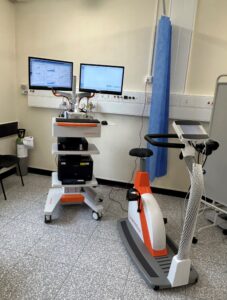Cardiopulmonary Exercise Testing (CPET) is an innovative way to diagnose exercise intolerance and for us to assess your ability to withstand the rigours of major surgery. A CPET can be done within a week from a referral from your surgeon, GP or physician.
Fit for surgery
Operations increase the body’s demand for oxygen in the same way as exercising does. This increased demand for oxygen lasts for several days after your operation.
If we know your fitness level and how your heart and lungs are likely to respond to surgery, we can tailor your anaesthetic to the demands of your surgery. That’s where a CPET can make all the difference.
Diseases that affect the heart, lungs, circulation, or blood will cause an abnormal response to exercise. Knowing this beforehand lets us prepare in advance to significantly improve your chance of a successful recovery.
Fit for life
Breathlessness and exercise intolerance have many different causes. CPET allows us to understand what is the most likely reason for someone’s reduced ability to exercise, whether it’s simply being unfit or overweight or if there is a more serious problem that requires further investigation such as breathing disorders or heart disease.
It can even tell us if breathlessness is due to issues with the circulation, the blood (such as anaemia) or with the function of the muscles themselves.
How CPET works
 CPET allows us to bring together the functions of the respiratory (breathing), cardiac (heart) and circulatory (blood) systems in one, non-invasive test. This is a major advance in diagnostics and the quality of care for patients undergoing major surgery.
CPET allows us to bring together the functions of the respiratory (breathing), cardiac (heart) and circulatory (blood) systems in one, non-invasive test. This is a major advance in diagnostics and the quality of care for patients undergoing major surgery.
Your appointment will last about an hour, but the actual period of exercise is usually between eight and 12 minutes. You will simply need to cycle on an exercise bike while breathing through a face mask.
Many patients worry about their fitness level before they take the test but CPET works for all; young or old, from the unfit to highly trained athletes. The team regularly see patients in their 60s, 70s and 80s (even 90s) who may already have a heart or lung condition.
The amount of exercise is relatively modest – all we require is that you give your best effort. During the test the patient you will be continuously monitored by the medical team. The monitored exercise will allow us to collect as much information about you as possible. This will help us plan what is needed for your operation and subsequent successful recovery.
What information will be analysed during the CPET?
- Continuous 12 lead exercise ECG
- Blood pressure
- Continuous oxygen saturation
- Breath by breath lung function
- Breath by breath oxygen uptake and CO2 production
Results
We aim to provide an overview of a test on the day. Your referring consultant will receive a detailed and comprehensive report including a personalised risk assessment based on your current level of fitness. This is usually within 48 hours. A copy of the report is usually sent to your GP, who has the opportunity to provide a treatment plan based on these results.
The CPET team have extensive experience in this field and have provided this service to the region since 2007. The test is conducted and interpreted by consultants who work in critical care and anaesthesia at the Trust.
CPET clinics are held every Thursday in the Chronic Pain department at Maidstone Hospital. For details please contact Eileen Hudson, Anaesthetic Secretary at Maidstone Hospital on 01622 224361 or at mtw-tr.cpet@nhs.net.
The CPET Clinic is led by Consultant in Anaesthesia and Intensive Care Medicine, Dr Mike Browning.
